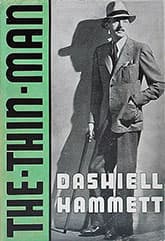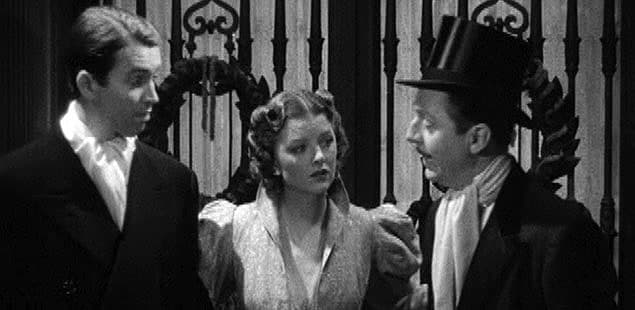The Thin Man
Critique • Quotes • At the movies
 First edition
First editionFirst publication
1933 in Redbook
First publication in book form
1934
Literature form
Novel
Genres
Crime, mystery
Writing language
English
Author's country
United States
Length
Approx. 62,500 words

James Stewart, left, joins the cast for 1936's After the Thin Man, the first Thin Man sequel.
After Another Shadow of the Thin Man Goes Home...
The Thin Man sequels (1936–1947): Five films, 86–112 minutes; directors W.S. Van Dyke (1936–1941), Richard Thorpe (1945), Edward Buzzell (1947); writers Dashiell Hammett, Albert Hackett, Frances Goodrich, Harry Kurnitz, Irving Brecher, Robert Riskin, Dwight Taylor, Stanley Roberts, Steve Fisher, Nat Perrin; featuring William Powell, Myrna Loy, James Stewart (1936), Sheldon Leonard (1939), Keenan Wynne (1947), Dean Stockwell (1947)
The Thin Man was such a box-office smash that it gave rise to five sequels: After the Thin Man (1936, costarring a young Jimmy Stewart), Another Thin Man (1939), Shadow of the Thin Man (1941), The Thin Man Goes Home (1945), and Song of the Thin Man (1947, costarring Jayne Meadows, Keenan Wynn and a very, very young Dean Stockwell).
It's amazing they hold up so well, considering the years the Thin Man films span includes the Great Depression, the Second World War and the beginning of the post-War period.
The films are progressively weaker, as is almost always the case with sequels, but only slightly so and still diverting. The sequel plots are still solid, having got a bit of help in the first two from the novelist. Following the first film, Hammett wrote the stories for After the Thin Man and Another Thin Man. After that the films are said to be "based on characters created by Dashiell Hammett". (The stories and Hammett's screen treatments have been discovered and published in recent years.)
Trailer for After the Thin Man, which largely carries on the fun of the first film.
The later films show the Charleses becoming more respectable. They feature less of their boozing, flirting and other misbehaving that had provided much of the hilarity in the novel and earlier films.
You may find the most noticeable dip in quality in the 1945 film, The Thin Man Goes Home, in which Nic starts uncovering Nazi plots. J.S. Van Dyke, who had directed the first four films to some acclaim, had died in 1943, leaving the helm to other, lesser lights.
A minor complaint about the last two sequels is that their titles give the impression Nick is the "thin man" who goes home and who has his swansong in the final flick of the series. The "thin man" is in fact a suspect in the first mystery and does not reappear in later stories or movies.
Great series overall though. The Thin Man series goes from terrific to very good to still okay over a period of six films.
William Powell and Myrna Loy had such screen magic between them that they made several other successful films together, mainly comedies but sometimes involving mystery as well. They're probably the most prolific, big-name, movie couple ever, beating even Tracy and Hepburn. But it's as Nick and Nora Charles they are most remembered.
Thinner pickings
Although Hammett's sleuthing couple have never been resurrected on celluloid since the Powell-Loy days, they have appeared in other media. A popular Thin Man series ran on radio from 1941 to 1950, with some early scripts written by Hammett. There was also The Thin Man television program in the late 1950s with Peter Lawford as Nick and Phyllis Kirk as Nora. The seventy half-hour episodes were light stuff but sported engaging banter between the leads.
And let's not forget all the male-female detective teams on later television shows who tried to recapture the Charles magic: Hart to Hart, McMillan and Wife, Moonlighting.... They never quite got it though. Never drank enough in my opinion.
In the movies, Hammett's sleuthing duo were parodied along with other famous detectives in Neil Simon's Murder By Death (1976). David Niven and Maggie Smith played "Dick and Dora Charleston". Good for one or two more laughs.
I await (in vain, I suspect) the definitive medium-boiled remake.
— Eric
Critique • Quotes • At the movies
1934, 1936–1947

